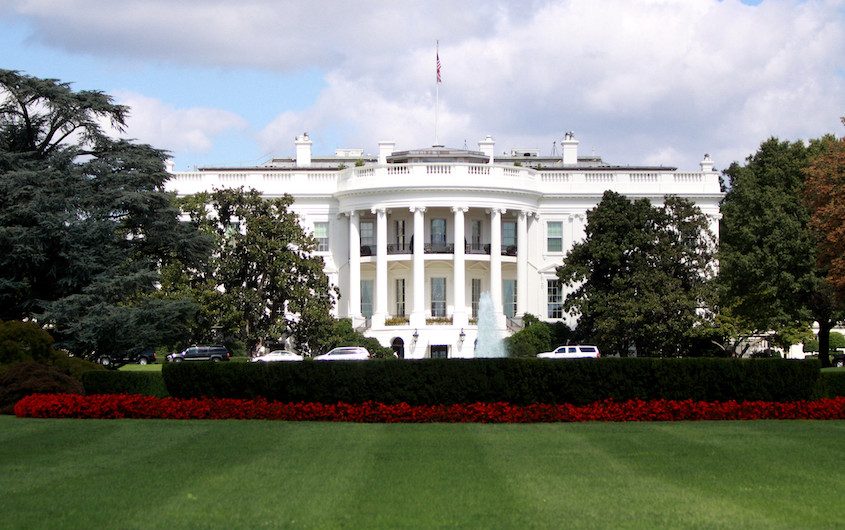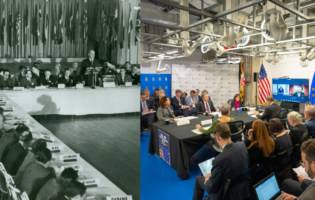AGI News
Peter Rashish Interviewed on Chancellor Merkel’s Washington, DC, Visit

Gage Skidmore via Flickr

Peter S. Rashish
Vice President; Director, Geoeconomics Program
Peter S. Rashish, who counts over 25 years of experience counseling corporations, think tanks, foundations, and international organizations on transatlantic trade and economic strategy, is Vice President and Director of the Geoeconomics Program at AICGS. He also writes The Wider Atlantic blog.
Mr. Rashish has served as Vice President for Europe and Eurasia at the U.S. Chamber of Commerce, where he spearheaded the Chamber’s advocacy ahead of the launch of the Transatlantic Trade and Investment Partnership. Previously, Mr. Rashish was a Senior Advisor for Europe at McLarty Associates, and has held positions as Executive Vice President of the European Institute, on the Paris-based staff of the International Energy Agency, and as a consultant to the World Bank, the German Marshall Fund of the United States, the Atlantic Council, the Bertelsmann Foundation, and the United Nations Conference on Trade and Development.
Mr. Rashish has testified on the euro zone and U.S.-European economic relations before the House Financial Services Subcommittee on International Monetary Policy and Trade and the House Foreign Affairs Subcommittee on Europe and Eurasia and has advised three U.S. presidential campaigns. He is a member of the Board of Directors of the Jean Monnet Institute in Paris and a Senior Advisor to the European Policy Centre in Brussels. His commentaries have been published in The New York Times, the Financial Times, The Wall Street Journal, Foreign Policy, and The National Interest, and he has appeared on PBS, CNBC, CNN, and NPR.
He earned a BA from Harvard College and an M.Phil. in international relations from Oxford University. He speaks French, German, Italian, and Spanish.
__
Ahead of the meeting between the U.S. and German leaders, Geoeconomics Program Director Peter Rashish spoke with the Italian news site Formiche.net. In the interview, “Biden’s Bet on Merkel and Beyond,” Mr. Rashish made the following points:
- When U.S. Secretary of State Tony Blinken was in Berlin last month, he said the United States has no better partner and friend than Germany. I think this was both a statement of fact and a wish for the future. That wish is for Germany to play a leading role in building a stronger EU that can partner with the Biden administration on issues like trade, climate, and technology, all of which are partly about China. U.S.-German bilateral relations are important, but for Biden Germany’s role in Europe is crucial.
- The irony is that although Biden is more transatlantic than Obama – in fact, the most transatlantic U.S. president since Kennedy – because of the distrust caused by the Trump years and his continuing popularity there is a certain wariness in Germany to jump into partnership with the Biden administration. This is especially true when it comes to China, where it will still take time for many Germans to reconcile themselves to the idea that the post-Cold War era is over and that Germany needs to act more strategically in the world.
- Merkel helped to keep shared values at the center of U.S.-German relations, for example in the way she defended the rules-based international economic order during four years of Trump’s attacks against the WTO, the G7, and U.S. trade deals. Along with Macron, she pushed for the NextGen EU recovery plan that deepens EU integration in a way that supports U.S. interests. But on China she chose not to use her considerable political capital to prepare her country for tough decisions that need to be taken about balancing Germany’s economic and security interests.
- Whatever the government that rules Germany after the September elections German-American relations will remain strong. There are civil society, commercial, and security ties between the two countries that are not matched by any other U.S. bilateral relationship. It is also true that the two most likely coalitions – CDU-Green or CDU-Green-FDP – would result in a somewhat different line on foreign policy, especially as regards China and Russia, one that should facilitate closer transatlantic cooperation.
His comments were originally published in Italian, which can be found here.








